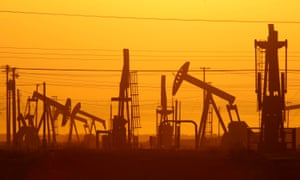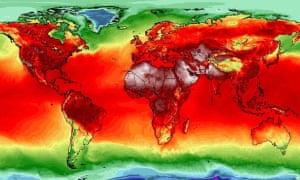The damage caused by our addiction to burning fossil fuels will be so widespread that nobody stands to gain
The year 2018 is on track to be the fourth warmest on record,
beaten only by 2016, 2015 and 2017. In other words, we have had the
warmest four-year run since we started measuring. According to data from
the US National Oceanic and Atmospheric Administration (NOAA), June
2018 is the 402nd consecutive month with temperatures above the 20th-century average. The UK’s Environmental Audit Committee has warned that we could see summer temperatures reaching 38C by the 2040s, leading to a potential 7,000 heat-related deaths a year.
One hot summer does not a changing climate make, but the trend in the global data is now irrefutable. When Michael Mann published the “hockey stick” graph back in 1998, there was vociferous public pushback, yet the observed temperature rises match what Mann had predicted. Today’s hockey stick graph isn’t a forward projection but a historical record. The world has been getting hotter, and it will continue to do so. The only question now is how much hotter it gets.
The mechanisms behind this are not difficult to understand. Over a period of millions of years, carbon became trapped in deposits under the Earth’s crust, as coal, oil and natural gas. As the great engines of industrialisation came online across the planet, humanity developed an insatiable hunger for this trapped carbon. Burning it powered the machines that drove economic growth and development, which in turn raised the demand for more machines and more carbon. Carbon that took millions of years to trap has been released into the atmosphere at a rate that is, in geological terms, almost instantaneous.
"Climate change isn’t happening, they said, and even if it is happening it’s nothing to do with us"
We have known about the probable impact that this sudden release of carbon into the atmosphere would have on the Earth’s climate since the middle of the last century. However, we have been unable and unwilling to do anything about it. To pull that carbon out of the ground we created giant corporations whose sole role was to find it, mine it and sell it. Our demand led to vast profits for these companies, and unfathomable riches for the people running them. This meant that when the research showed that our insatiable carbon demand needed to be curbed for the good of the planet, there was a very powerful interest group in place with a vested interest in keeping it going.
But by the time this 10-year window closed in 1988, the energy companies had been pouring money not into reducing carbon but into denying the reality of climate change. Through well-orchestrated media campaigns and lobbying efforts, a standard narrative of denial had been firmly entrenched as common knowledge. Climate change isn’t happening, they said, and even if it is happening it’s nothing to do with us, and even if it is something to do with us it would be too expensive to change it. The fossil fuel lobby managed to convince lawmakers and huge swaths of the broader public that this was a battle between “business” on the one hand, and a coalition of corrupt scientists and hippies on the other.

One hot summer does not a changing climate make, but the trend in the global data is now irrefutable. When Michael Mann published the “hockey stick” graph back in 1998, there was vociferous public pushback, yet the observed temperature rises match what Mann had predicted. Today’s hockey stick graph isn’t a forward projection but a historical record. The world has been getting hotter, and it will continue to do so. The only question now is how much hotter it gets.
The mechanisms behind this are not difficult to understand. Over a period of millions of years, carbon became trapped in deposits under the Earth’s crust, as coal, oil and natural gas. As the great engines of industrialisation came online across the planet, humanity developed an insatiable hunger for this trapped carbon. Burning it powered the machines that drove economic growth and development, which in turn raised the demand for more machines and more carbon. Carbon that took millions of years to trap has been released into the atmosphere at a rate that is, in geological terms, almost instantaneous.
"Climate change isn’t happening, they said, and even if it is happening it’s nothing to do with us"
We have known about the probable impact that this sudden release of carbon into the atmosphere would have on the Earth’s climate since the middle of the last century. However, we have been unable and unwilling to do anything about it. To pull that carbon out of the ground we created giant corporations whose sole role was to find it, mine it and sell it. Our demand led to vast profits for these companies, and unfathomable riches for the people running them. This meant that when the research showed that our insatiable carbon demand needed to be curbed for the good of the planet, there was a very powerful interest group in place with a vested interest in keeping it going.
But by the time this 10-year window closed in 1988, the energy companies had been pouring money not into reducing carbon but into denying the reality of climate change. Through well-orchestrated media campaigns and lobbying efforts, a standard narrative of denial had been firmly entrenched as common knowledge. Climate change isn’t happening, they said, and even if it is happening it’s nothing to do with us, and even if it is something to do with us it would be too expensive to change it. The fossil fuel lobby managed to convince lawmakers and huge swaths of the broader public that this was a battle between “business” on the one hand, and a coalition of corrupt scientists and hippies on the other.

But not all businesses are energy companies. Every business and every person lives on the planet now, where costs will rise because of climate change. A study by the Economics of Climate Adaptation (ECA) working group found that losses due to climate change could reach up to 19% of GDP in some parts of the world by 2030.
For all our talk of climate denial being the “business” position, we’ve strangely ignored the insurance industry, especially the climate research branches of the major reinsurance firms. Swiss Re is part of the ECA working group, and Munich Re’s geo risks research department has been in place since 1973, four years before Black wrote his memo. This is not because reinsurance is some enclave of liberal hippies nestled in the bosom of capitalism, but because their industry, by definition, can’t rely on kicking the can down the road and letting someone else pick up the pieces. If we get floods, famines and droughts leading to mass migration events, they’ll be among the ones paying out.
It was easy to let ourselves believe that what was good for energy companies would be good for us all, because the immediate upsides of the cheap carbon windfall were so compelling. There was no problem that couldn’t be solved by throwing more fossil fuels at it, and the reality of climate change threatened to tell us what it cost. The fossil fuel industry told us that we could take out an interest-only mortgage against the future of the planet and prices would always go up, interest rates would always go down and there would never be a reckoning. We now find ourselves facing repayments on the scale of trillions of dollars. That does not even cover the human costs that these dry figures obscure: the lives lost, the homes flooded, the farms wasted away to drought.
It is impossible to map the path not taken. Perhaps a commitment to reducing carbon consumption could have spurred innovation in alternative sources of energy. Or maybe the path we are on is an inevitable result of an economic system that cannot stop unless it crashes. We’ve seen the “Minsky cycle” of speculation leading to crash play out time and again in the financial sector; perhaps climate change is a centuries-long Minsky cycle we could never hope to stop. Maybe we are destined to become the civilisational equivalent of Monty Python’s Mr Creosote, a man who gorged himself until he literally exploded.
Regardless of the alternative histories and the might-have-beens, it may be too late to stop it, but we still need to learn an important lesson. If a CEO tells us that it would be bad for business if they weren’t allowed to pump poison into the air and water, then that’s too bad for them: one business is not an economy, and it certainly isn’t a biosphere. We’d have survived the crisis of an oil CEO missing out on his fifth yacht, but many won’t survive the consequences of letting them lead us by the nose into disaster.
• Phil McDuff writes on economics and social policy

No comments:
Post a Comment